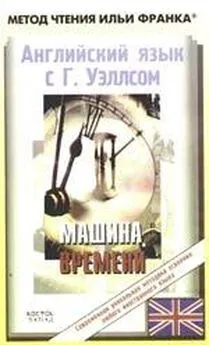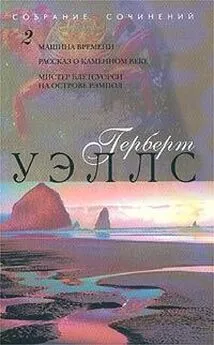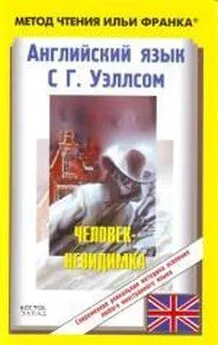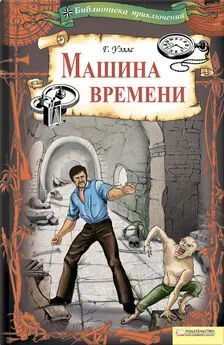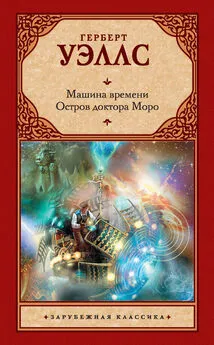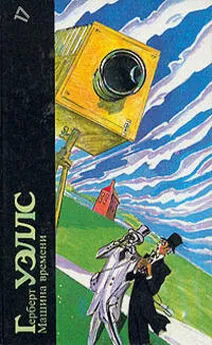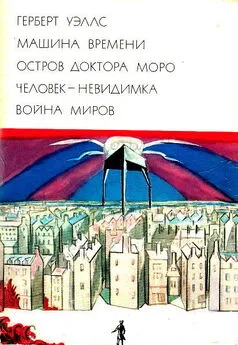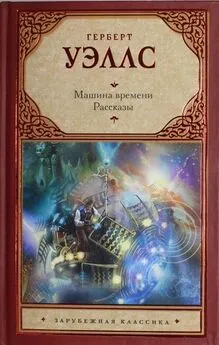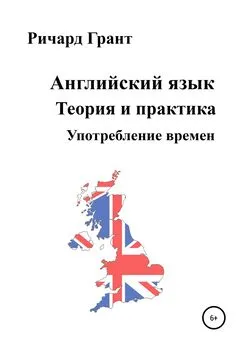H. Wells - Английский язык с Гербертом Уэллсом. Машина Времени
- Название:Английский язык с Гербертом Уэллсом. Машина Времени
- Автор:
- Жанр:
- Издательство:неизвестно
- Год:неизвестен
- ISBN:нет данных
- Рейтинг:
- Избранное:Добавить в избранное
-
Отзывы:
-
Ваша оценка:
H. Wells - Английский язык с Гербертом Уэллсом. Машина Времени краткое содержание
Английский язык с Гербертом Уэллсом. Машина Времени - читать онлайн бесплатно полную версию (весь текст целиком)
Интервал:
Закладка:
I woke with a start (вздрогнув: «со вздрагиванием», я проснулся), and with an odd fancy that some greyish animal had just rushed out of the chamber (и мне почудилось, что какое-то сероватое животное спешно выскользнуло из спальни ; to rush — спешить; chamber — жилоепомещение/комната, кабинет, спальня/ ). I tried to get to sleep again (я попытался уснуть снова), but I felt restless and uncomfortable (но чувствовал беспокойство и стеснение). It was that dim grey hour when things are just creeping out of darkness (был тот тусклый серый = ранний час, когда предметы только начинают выступать из темноты; to creep — ползать; медленнопродвигаться ), when everything is colourless and clear cut, and yet unreal (когда все вокруг /кажется/ бесцветным, уменьшенным в ясности = замутненным и каким-то нереальным). I got up, and went down into the great hall (я встал и спустился в большой зал), and so out upon the flagstones in front of the palace (а затем, пройдя по каменным плитам, вышел из дворца). I thought I would make a virtue of necessity (я подумал, что мне следует извлечь /хоть какую-нибудь/ пользу из этой необходимости; virtue— добродетель; преимущество, польза ), and see the sunrise (и посмотреть восход солнца).
rush [rAS], chamber [`CeImbq], virtue [`vWtjH]
I woke with a start, and with an odd fancy that some greyish animal had just rushed out of the chamber. I tried to get to sleep again, but I felt restless and uncomfortable. It was that dim grey hour when things are just creeping out of darkness, when everything is colourless and clear cut, and yet unreal. I got up, and went down into the great hall, and so out upon the flagstones in front of the palace. I thought I would make a virtue of necessity, and see the sunrise.
'The moon was setting (луна закатывалась), and the dying moonlight and the first pallor of dawn were mingled in a ghastly half-light (и ее прощальные лучи и первые бледные /проблески/ рассвета смешивались в таинственный полусвет; pallor — бледность; to mingle — смешивать/ся/ ). The bushes were inky black (кусты были = казались чернильного цвета = совсем черными), the ground a sombre grey (земля — темно-серой), the sky colourless and cheerless (а небо — бесцветным и унылым; cheerless — угрюмый, унылый ). And up the hill I thought I could see ghosts (на верху холма мне почудились привидения). There several times, as I scanned the slope (там же несколько раз, пристально разглядывая склон; to scan — просматривать; пристальноразглядывать, изучать ), I saw white figures (я видел белые фигуры). Twice I fancied I saw a solitary white, ape-like creature running rather quickly up the hill (дважды мне показалось, что я вижу какое-то одинокое белое обезьяноподобное существо, бегущее довольно быстро к вершине холма), and once near the ruins I saw a leash of them carrying some dark body (а один раз около руин я увидел их целую толпу: они тащили какое-то темное тело; leash — поводок; свора /изтрехсобак/ ). They moved hastily (они двигались быстро). I did not see what became of them (я не видел, что с ними стало = куда они делись). It seemed that they vanished among the bushes (казалось, они скрылись среди кустов). The dawn was still indistinct, you must understand (рассвет еще был нечетким = неполным , видите ли: «вы должны понимать»). I was feeling that chill (я чувствовал озноб), uncertain, early-morning feeling you may have known (то неопределенное ощущение раннего утра, которое вам всем, вероятно, знакомо). I doubted my eyes (я не верил своим глазам; to doubt — сомневаться ).
рallor [`pxlq], mingle [mINgl], sombre [`sOmbq], dawn [dLn]
'The moon was setting, and the dying moonlight and the first pallor of dawn were mingled in a ghastly half-light. The bushes were inky black, the ground a sombre grey, the sky colourless and cheerless. And up the hill I thought I could see ghosts. There several times, as I scanned the slope, I saw white figures. Twice I fancied I saw a solitary white, ape-like creature running rather quickly up the hill, and once near the ruins I saw a leash of them carrying some dark body. They moved hastily. I did not see what became of them. It seemed that they vanished among the bushes. The dawn was still indistinct, you must understand. I was feeling that chill, uncertain, early-morning feeling you may have known. I doubted my eyes.
'As the eastern sky grew brighter (когда небо на востоке: «восточное небо» стало ярче), and the light of the day came on and its vivid colouring returned upon the world once more (и свет дня вернулся, и его живые краски опять возвратились в мир), I scanned the view keenly (я тщательно обследовал местность). But I saw no vestige of my white figures (но не нашел и следов белых фигур). They were mere creatures of the half light (это были создания полусвета). "They must have been ghosts (может быть, это привидения)," I said (сказал я); "I wonder whence they dated (интересно, к какому времени они принадлежат; todate— датироваться, относиться к какому-либо временному периоду )." For a queer notion of Grant Allen's came into my head (любопытный вывод Грант Аллена [1]пришел мне в голову), and amused me (и позабавил меня). If each generation die and leave ghosts, he argued (если бы каждое поколение, умирая, оставляло после себя привидения, утверждал он; to argue — спорить; утверждать ), the world at last will get overcrowded with them (то в конце концов весь мир переполнился бы ими; to overcrowd — переполнять/помещение/; crowd —толпа ).
vivid [`vIvId], wonder [`wAndq], whence [wens]
'As the eastern sky grew brighter, and the light of the day came on and its vivid colouring returned upon the world once more, I scanned the view keenly. But I saw no vestige of my white figures. They were mere creatures of the half light. "They must have been ghosts," I said; "I wonder whence they dated." For a queer notion of Grant Allen's came into my head, and amused me. If each generation die and leave ghosts, he argued, the world at last will get overcrowded with them.
On that theory they would have grown innumerable some Eight Hundred Thousand Years hence (по этой теории, их должно было накопиться бесчисленное множество за восемьсот тысяч прошедших лет; hence — отсюда, прочь; сэтоговремени ), and it was no great wonder to see four at once (и не было ничего удивительного увидеть сразу четырех). But the jest was unsatisfying (эта шутливая мысль не удовлетворила меня; to satisfy — удовлетворять; jest — острота, шутка ), and I was thinking of these figures all the morning (и я думал об этих фигурах все утро), until Weena's rescue drove them out of my head (пока спасительное появление Уины не вытеснило их из моей головы; to drive out /of/ — выбивать; вытеснять ). I associated them in some indefinite way with the white animal (я связал их каким-то неопределенным образом с белым животным), I had startled in my first passionate search for the Time Machine (которое я вспугнул при первых импульсивных поисках Машины Времени). But Weena was a pleasant substitute (Уина была приятным замещением; substitute — заместитель; замещение ). Yet all the same (но, несмотря на это), they were soon destined to take far deadlier possession of my mind (/белые фигуры/ были обречены вскоре еще неумолимее овладеть моими мыслями; to destine — предрешать; зд. обрекать; deadly — смертельный; беспощадный, неумолимый; possession — владение, обладание ).
innumerable [I`njHm(q)rqbl], search [sWC], substitute [`sAbstItjHt]
On that theory they would have grown innumerable some Eight Hundred Thousand Years hence, and it was no great wonder to see four at once. But the jest was unsatisfying, and I was thinking of these figures all the morning, until Weena's rescue drove them out of my head. I associated them in some indefinite way with the white animal I had startled in my first passionate search for the Time Machine. But Weena was a pleasant substitute. Yet all the same, they were soon destined to take far deadlier possession of my mind.
'I think I have said how much hotter than our own was the weather of this Golden Age (думаю, я уже говорил, насколько теплее нашего климат Золотого Века). I cannot account for it (я не могу объяснить причину этого). It may be that the sun was hotter (может быть, солнце стало горячее), or the earth nearer the sun (или земля стала ближе к солнцу). It is usual to assume that the sun will go on cooling steadily in the future (принято считать, что солнце постепенно будет охлаждаться в будущем; to cool — охлаждать/ся/ ). But people, unfamiliar with such speculations as those of the younger Darwin (однако, люди, незнакомые с рассуждениями вроде тех, как у Дарвина [2]младшего; familiar — знакомый/скемиличем-либо/ ), forget that the planets must ultimately fall back one by one into the parent body (забывают, что планеты должны в конце концов упасть одна за другой на центральное светило; parent — родитель; источник, причина, начало; зд. центр ). As these catastrophes occur (по мере того, как будут происходить эти катастрофы), the sun will blaze with renewed energy (солнце будет сиять с обновленной энергией; to blaze — горетьяркимпламенем; сиять, сверкать; to renew — обновить ); and it may be that some inner planet had suffered this fate (и весьма возможно, что одну из старых планет постигла эта участь; inner — внутренний; старый; to suffer — /по/страдать/отчего-либо/ ). Whatever the reason (но какова бы ни была причина), the fact remains that the sun was very much hotter than we know it (факт оставался /фактом/: солнце было значительно горячее, чем мы знаем = в наше время; to remain — оставаться ).
Читать дальшеИнтервал:
Закладка:
